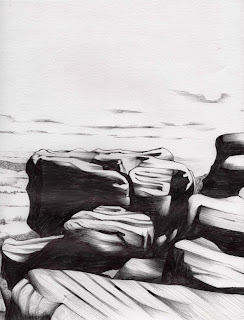- I primarily chose to study at the LCA thanks to my positive experience during the foundation diploma of the same college. I learnt a great deal during that program and I wished to further explore and develop my practice, it seemed logical to remain in Leeds.
- Studying at the LCA has become somewhat of a tradition as I am the third generation to have studied here, I chose to pursue illustration as it best suited my personal interests.
- Illustration has become increasing central to my general practice of making things. Perhaps there was a time when I considered product or prop design, however illustration has proved to be more stimulating. I hope to introduce room for a crossovers over the next few years and beyond.
- Admittedly I was aware that several of the people that I had met during my foundation also hoped to pursue this course. I thought it would be most pleasing to build on the links that had been forged.
- The general prominent reputation of the LCA also fuelled my interest, for it has produced many successful practitioners of the arts. I would finally add that the opportunity to be in the courses' first ever group was too good a chance to pass up.
Dr Grordbort's Infallible Aether Oscillators
A fusion of illustrative design and prop making.
What do you want to Learn during my time on the programme?
- I hope to expand my practice in order to explore new and exciting areas of illustration. The professional format of a degree will certainly do as much and perhaps push me into trying things that I would not otherwise try.
- Crucially I would like to refine my current methods by critically analysing their merits and demerits. Through this process I can strive to be the best sort of illustrator I can be.
- I would gladly like to find out how I can make my work marketable and improve my accessibility to the existing industry. To be able to monetise my work is a key area which I would like to look into.
- Additionally I hope to pursue my own individuality in terms of illustrative practice. As I find that work is greatly improved by the certain presence of uniqueness and genuine personality rather than regurgitated popular culture.
- I have long been fascinated by the impact of historical context. Unfortunately secondary school education did little but focus on key individuals. I rather think that art [and thus illustration] has a wonderful way of evidencing social and political change. Through context of practice I hope to study as such and use it to improve my own work.
What 5 skills are your strengths?
- Without boasting I rather think I have a good attention to the nuances of detail, whilst having the patience and attention to rely such information through my practice.
- I find that pulling out angles and lines in imagery is most aesthetically satisfying, and that this exaggeration can be used to furtively communicate themes.
- I find that my use of biro is quite good, considering it often provokes a positive response as opposed to my other uses of tool. I think it is a particularly under-rated medium, whilst paradoxically been over used by many illustrators.
- Additionally I have a keen ability to pull out contrasting light and dark to create form and allude to depth and texture.
- Over the lest two years I have continually been involved in large collaborative projects in modding communities. Thus I am already familiar with how to work as part of a team and exploiting the specialisations of each member.
A small section of a biro landscape drawing I did during the summer
What do you want to improve?
- It would be great to decrease my dependance on the medias in which I am [perhaps overly] familiar with. I particularly look forward to improving my use of digital tools and the use of brush-based applications such as oil painting or water colour.
- Hopefully I shall also boost my clarity of communication. I have a record of presuming that my work is plain or obvious, and then becoming frustrated at my lack of foresight.
- I rarely become disinterested in a project, but when it does occur it can drastically impact on the quality of my final piece. I find that a listless visual response is devoid of personality and becomes uninteresting to the viewer.
- It would be most practical to create links to practitioners and gain an insight to the modern industry of illustration. As it stands I have a limited knowledge at best and am quite unequipped to suddenly launch a business or find paying work.
- I am pretty good at drawing the inanimate such as landscapes, buildings and monstrous technological machinery. I would like to become more versed in the study of people in movement.
In what way will you evaluate your progress?
- I shall certainly use this blog in order to critically analyse how successful or unsuccessful my work is. In doing so I can seek to improve my future work.
- Through the use of my sketchbooks I can test and experiment my methods of practice. This involves an ongoing evaluation to improve the quality and clarity of my work.
- With peer reviews I can gain the insight of other students who may work in a similar fashion, or perhaps a completely different methodology. Either way outsider opinions can help centre my evaluative compass and limit my personal bias.
- By seeking the advice of tutors I can take advantage of their generally larger experience in relation to my own and improve my work, or perhaps explore new avenues of practice.
- Formally I will undergo deadlines and feedback which will give me raw information in regards to the success or failings of my work.


No comments:
Post a Comment